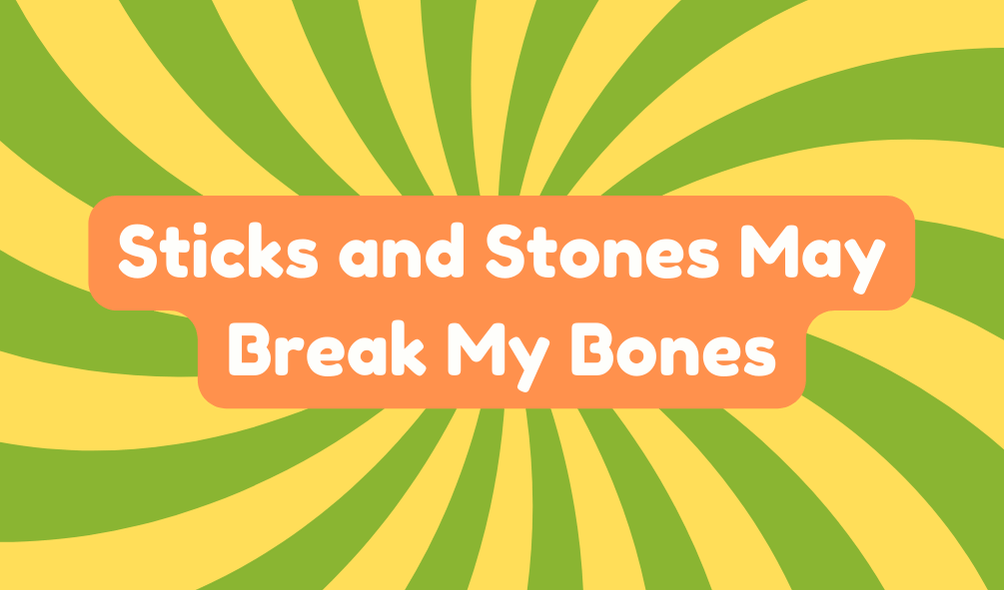The phrase "sticks and stones may break my bones" suggests that physical harm is more serious than verbal insults. It encourages resilience, implying words should not affect one's self-worth. While it promotes a dismissive attitude towards negativity, it also overlooks emotional pain caused by insults. The phrase has historical roots in responses to bullying, prioritizing physical harm over emotional distress. Understanding this notion requires deeper insight into its societal implications and relevance today might reveal more complexities.
Synonyms
In the domain of language, the phrase "sticks and stones may break my bones" serves as a protective mantra against verbal adversities. This expression has parallels in various similar expressions that also aim to bolster individual resilience. As language evolves, such phrases reflect society's coping mechanisms regarding verbal hostility. Some significant synonyms include:
- "Words will never hurt me"
- "Ignore the naysayers"
- "Let it roll off your back"
- "Brush it off"
- "Rise above the insults"
These phrases convey the importance of inner strength while illustrating how language and meaning adapt over time, merging tradition and modern sentiments in the face of adversity.
Example of Sentences
Examples of sentences using the phrase "sticks and stones may break my bones" highlight its role in promoting resilience against verbal attacks. Drawing on the phrase emphasizes a critical perspective on childhood insults, urging individuals to cultivate verbal resilience.
- Words can sting, but they lack physical power.
- Insults may be plentiful, yet they can be dismissed.
- Developing resilience shields from harmful words.
- Understanding this phrase encourages emotional growth.
- Acknowledging that sticks and stones can hurt, but words need not.
Through these examples, the phrase serves as a rallying call to reject the weight of derogatory verbal assaults.
Origin
The phrase "sticks and stones may break my bones" has a notable history dating back to its first recorded appearance in The Christian Recorder in March 1862. Its historical significance lies in its role as a societal response to verbal bullying, suggesting that physical attacks bear more weight than insults. While the phrase aims to promote resilience, its social implications are complex; it may inadvertently downplay the emotional harm caused by words. This duality reflects a critical view of how society prioritizes physical over emotional well-being, challenging readers to reconsider the true impact of language in everyday interactions and personal growth.
Collocations
Collocations play an essential role in understanding the phrase "sticks and stones may break my bones" and its usage in various contexts. By examining related terms, one can appreciate the constructs of verbal resilience and personal strength. These collocations create nuanced meanings that deepen comprehension and applicability in everyday life. Consider the following examples:
- Words of encouragement
- Expressions of empowerment
- Language of defiance
- Phrases of support
- Statements of confidence
How to Use in Everyday Language
Many individuals may encounter situations where the phrase "sticks and stones may break my bones" seems applicable. Using the phrase can serve as a powerful tool for assertive responses, particularly in the face of verbal cruelty. It encourages individuals to regard insults as inconsequential. To effectively employ this phrase, one must situate it within conversations that challenge harmful language, reinforcing personal resilience. However, it is essential to acknowledge that while this phrase promotes strength, it may also inadvertently undermine real emotional suffering. Consequently, awareness and discernment in its application are critical for fostering genuine dialogue and personal growth in social interactions.
Why Is It Still Relevant Today?
Why does the phrase "sticks and stones may break my bones" continue to resonate in today's society? Its significance endures as a symbol of verbal resilience and social courage, helping individuals navigate the complexities of interpersonal interactions. Amidst rising social tensions and digital communication, this adage encourages a robust response to insults, emphasizing that emotional wounds, unlike physical ones, require inner strength to overcome. Critics may argue that this mindset oversimplifies conflict, yet it underscores a crucial lesson: developing resilience and courage can empower individuals to face verbal aggression without succumbing to negative emotions, fostering a healthier, more assertive community.







